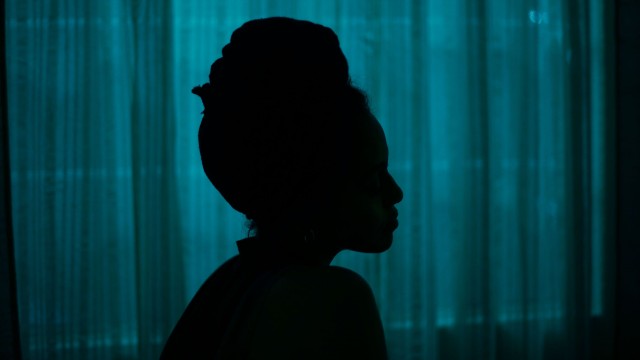Relocating can be an isolating and testing time. For Esi, the main character in Maisie Richardson-Sellers’ 13-minute short Sunday’s Child, she has just moved to LA in the pursuit of her dream to be a photographer. Attempting to break into an often ruthless industry, she is finding the process challenging, especially in the absence of a support system. Capturing the importance of community, Sunday’s Child may open with a sense of solitude, but ends overflowing with warmth and energy, only found in that moment when we finally get a sign that we are where we are supposed to be.
“I so rarely see myself positively and truthfully represented on screen”
Esi’s emotional journey feels so authentic that it came as no surprise when co-writer/director Richardson-Sellers shared with us that the inspiration behind the film came from her own personal journey and conversations with QPOCs. Representation was also an important part of the creative process: “As a queer woman of color, I so rarely see myself positively and truthfully represented on screen”.
With a long exposition, Richardson-Sellers did not shy away from taking her time to introduce her protagonist and her current inner conflict. Esi is instantly likable and as we discover that she is navigating a situation where she isn’t even able to vent to anyone, you really begin to empathize with her character. As we discover that her relationship with her mother has become strained because of her artistic aspirations, and even worse because of who she is, it only makes her more endearing, engaging the audience deeper in her story. This attachment to Esi works to make that final party scene, and that feeling that everything will be ok, all the more powerful.

Chauntice Green as Esi, the lead character in Sunday’s Child
On the surface, what happens during Sunday’s Child might initially feel quite mundane, even uneventful, but for Esi it marks a huge change and the hopeful opening of a new chapter. Anyone in any artistic field who has felt alone and struggled with imposter syndrome will find the film incredibly relatable. The narrative structure and how Esi’s emotional state is brought to the screen gives the short broad appeal, it’s essentially a journey of self-acceptance, which is as universal as a story can be.
The impeccable production values and craft contribute to the emotional effectiveness of the moment, but it is Chauntice Green’s portrayal of Esi that makes the film such a moving and engaging watch. With nuance, she fleshes out her character as someone to root for and respect, her performance becoming more and more compelling as her character deals with all the personal and professional challenges that come her way. At Sunday’s Child’s emotional climax, which initially appears undramatic, she carries the weight of that moment, making her relief contagious through the screen by radiating a new positive energy.
Sunday’s Child is Richardson-Sellers’ directorial debut. While she is mostly known for her work in front of the camera (The Kissing Booth 2 or DC: Legends of Tomorrow), she plans on wearing the director’s hat again with a new short film, which she wrote, now in pre-production. She is also developing a TV series, and has directed an episode (the 14th) in the 6th season of DC: Legends of Tomorrow, set to air later this year.

 Céline Roustan
Céline Roustan